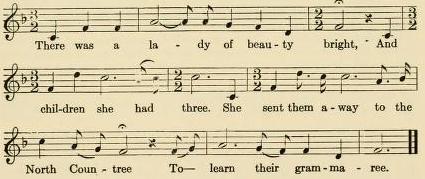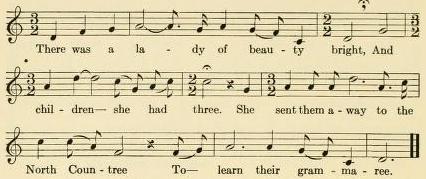Three Little Babes- Greer (NC) 1915 Brown E
[From the Brown Collection of NC Folklore, Vol. 2, 1952 with supplementary music in Vol. 4. Their notes follow. Associated with the Brown Collection are the Abrams Collection and the I.G. Greer collection. Greer has nearly a dozen music sheets of this ballad - mostly they are rewrites of one or two versions. Greer and his wife sang a version recorded in 1929 (unissed) and 1941.
The unusual resemblance to Smith's version D is noted. Also similar to C but the opening is different than C. All three use the repetition of 'mammee' for mother- which should be rare especially with that spelling.
Two music versions are presented below E and E1.
R. Matteson 2015]
25. The Wife of Usher's Well (Child 79)
This admirable ballad has lasted better in America, for some reason, and especially in the South, than in the land of its birth. See BSM 55-6, and add to the references there given Florida (SFLQ VIII 152-3), Missouri (OFS I 122-4), Ohio (BSO 46-7), Indiana (BSI 97), and Michigan (BSSM 146). All American texts belong to one version, with a strong religious coloring. The North Carolina collection has nine texts, but not all need be given here.
E. 'Three Little Babes' or 'The Wife of Usher's Well' or 'Lady Gay.' Apparently known by all three names. Sent in with the tune in 1915 or 1916 by I. G. Greer of Boone, Watauga county. The text is the same as C. [Text from Greer Collection -provided along with music -vol. 4]
Three Little Babes- Lyric var. 1 Greer Collection
There was a lady of beauty bright,
And children she had three;
She sent them away to the north countree
To learn their grammaree.
They hadn't been gone so very long,
Scarcely three months and a day,
When there came a sickness all over the land
And swept them all away.
And when she came this for to know,
She wrung her hands full sore,
Saying alas! alas! what shall I do,
For I'll never see my babes any more.
Ain't there a king in Heaven, she said,
Who used to wear a crown?
I pray the lord will me reward
And send my three babes down.
It was a-comin' near Christmas time,
And the nights were long and cold,
When her three little babes come runnin' down
To their dean mother's home.
She set a table for them there,
All covered with cakes and wine,
And said, Come eat, my dear little babes,
Come, eat and drink of mine.
We do not want your cakes, mammee,
We do not want your wine;
For in the morning by break of day,
With our Saviour we must dine.
She fixed them a bed in the backmost room,
All spread o'er with clean white sheets,
And on the top a golden one,
That they might soundly sleep.
Take it off,take it off, mammee, they said,
Take it off we say again.
A woe, a woe to this wicked world,
So long since pride began.
Cold clods lie at our heads, mammee,
Green grass grows at our feet;
The tears come running down your cheeks
To wet out winding-sheet.
Rise up, rise up, said the oldest one,
I hear the rooster crow;
Oh, yonder stands our Saviour dear,
And to him we must go.
E. 'The Wife of Usher's Well.' Recorded as ms score from I. G. Greer of Boone, Watauga county, 1915 or 1916. Basically, this version is related to the Smith version, 25D. For variants of text cf. BB, 50-1.

For melodic relationship cf. SharpK I 160, No. 22Q, first and second cadences and measures 6-7. Scale: Hexachordal, plagal. Tonal Center: f. Structure: abb1a1 (2,2,2,2).
E (1) 'Three Little Babes' or 'Lady Gay.' Sung by Dr. L G. Greer. Likewise recorded as MS score at Boone, Watauga county, 1915 or 1916. The singer stated that the same tune goes for this version as for the first. Melodically speaking, there are only negligible deviations in the second recording. The metrical distribution, however, differs in the basic values.

For melodic relationship cf. **SharpK i 151-9, No. 22 B, F, I, K, M, N, and some measures of P. Our first three measures are like those of version G. Others are BT 155, and FSKM 5. Scale: Mode II, plagal. Tonal Center: d. Structure: abb1a1 (2,2,2,2).